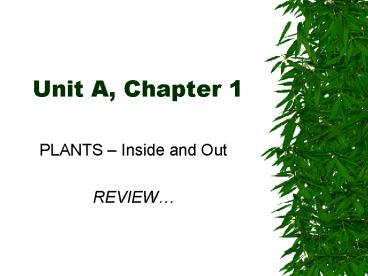Unit A, Chapter 1
1 / 13
Title: Unit A, Chapter 1
1
Unit A, Chapter 1
- PLANTS Inside and Out
- REVIEW
2
Karly placed a white-flowered plant with the
roots attached in a vase of water. She added a
few drops of red food coloring. Using arrows,
show how the red water traveled through the
plant.
3
A scientist calculated that if the roots from one
rye grass plant were laid end to end, they would
be 387 miles long. Why do plants have so many
roots?
4
Roots are the plant parts that absorb water and
minerals. More roots increase surface area of
the plant so it can quickly absorb soil water.
5
Draw three plant foods that you eat. Label the
food and the plant part.
6
What kind of cells do you think celery strings
are made of?
Xylem and Phloem Cells
7
What is their job?
They transport water up the stem and sugars down
through the stem.
8
What can you learn from the cross section of a
tree?
The age of the tree and when dry and wet years
occurred.
9
Kirsten and Sarah were walking along the road.
They spotted a plant with small green flowers,
and one with red, tube-like flowers. Which flower
is likely to be visited by bats or hummingbirds?
Explain your answer.
The red tube-like flower would be more likely to
be visited. The color attracts the animals.
Nectar, found inside the tube-like part, can be
sucked out by a bat or hummingbird.
10
The part of a plant that pushes its way through
soil is the
root cap
11
The cell part that allows water and dissolved
minerals to pass into and out of the cell is the
cell membrane
12
The plan part that protects a tree from disease
is
bark
13
The part of a plant that anchors it and absorbs
moisture is the
root































